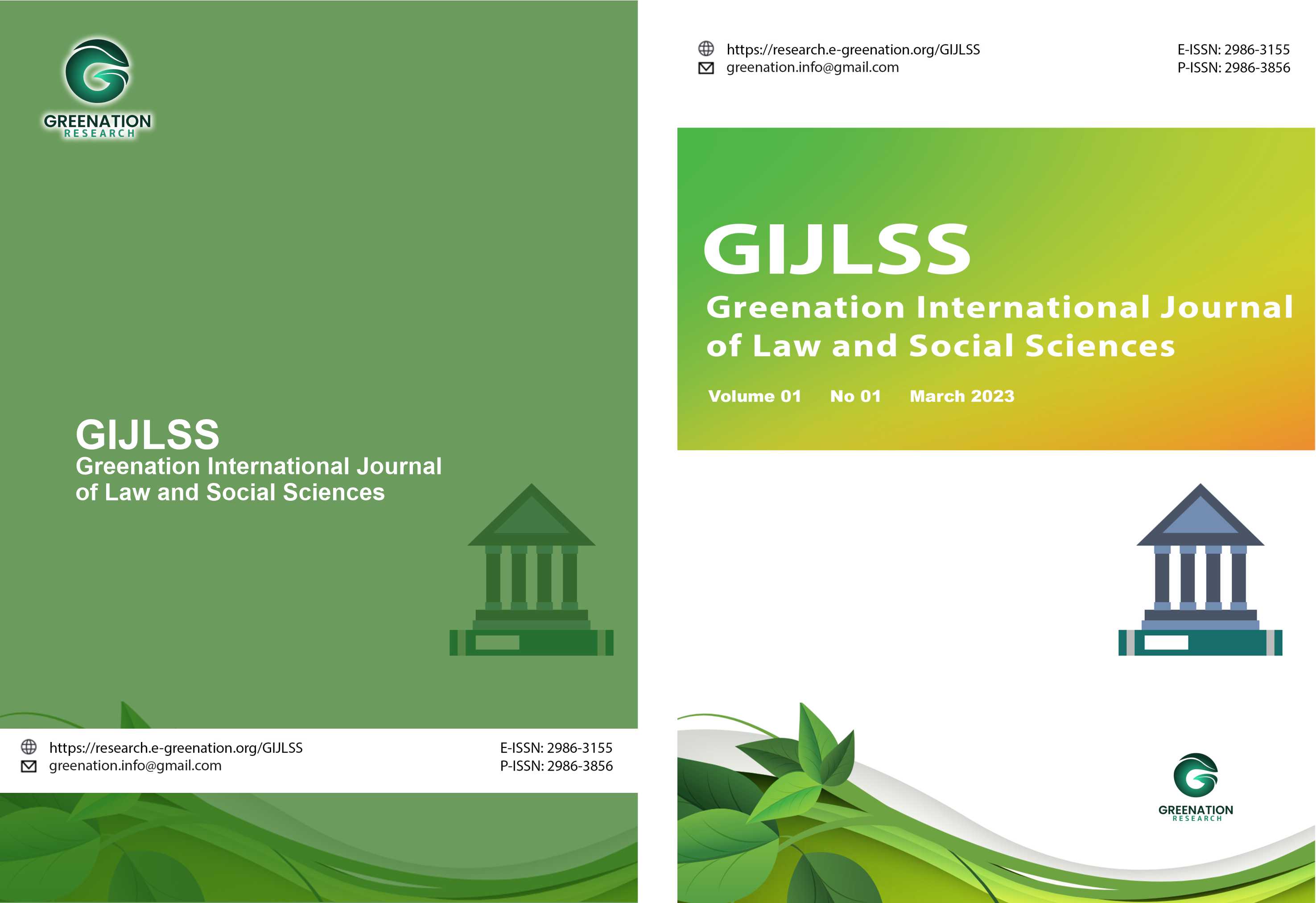Implications of Non-Refoulement for Refugees and Asylum Seekers Suspected of Serious Crimes from an International Law Perspective
DOI:
https://doi.org/10.38035/gijlss.v3i3.599Keywords:
Non-Refoulement, Refugees, Asylum Seekers, Serious Crimes, International Criminal LawAbstract
The principle of non-refoulement is a fundamental norm of international law that prohibits countries from returning refugees or asylum seekers to territories where they are at risk of torture, ill-treatment, or serious threats to their life and freedom. Its implementation faces challenges when refugees or asylum seekers are suspected of being involved in serious crimes, such as terrorism, war crimes, or transnational crimes. This study uses a juridical-normative approach by examining international legal instruments, including the 1951 Convention Relating to the Status of Refugees and its 1967 Protocol (Article 33 on non-refoulement and Article 1F on exclusion clauses), and the Convention Against Torture (CAT) Article 3. At the national level, the study refers to Law No. 6 of 2011 on Immigration and Presidential Regulation No. 125 of 2016 on the Handling of Refugees from Abroad. The analysis shows that although exclusion clauses allow countries to refuse protection to perpetrators of serious crimes, the principle of non-refoulement remains binding when there is a risk of torture or inhumane treatment. Thus, states need to prioritize alternative mechanisms such as domestic prosecution (aut dedere aut judicare), extradition with guaranteed human rights protection, or resettlement in a third country. This study recommends the creation of a comprehensive national refugee law to balance international obligations, human rights protection, and state sovereignty.
References
Abdul, L. M. (2024). Perspektif Hukum HAM Terhadap Pengungsi Akibat Konflik Menurut Konvensi Wina 1951 Tentang Pengungsi. Lex Privatum, 13(5).
Achnisundani, D. A. (2025). Paradoks Pengungsi: Antara Perlindungan HAM Dan Kedaulatan Nasional Dalam Krisis Kemanusiaan. Journal Of Law And Nation, 4(2), 371-393.
Fahamsyah, E. T. (2022). Penerapan Prinsip Aut Dedere Aut Judicare Terhadap Pelaku Cybercrime Lintas Negara Melalui Ratifikasi Budapest Convention. Jurnal Hukum Dan Syariah De Jure, 14(1).
Gustini, D. R. (2023). Perlindungan Hak Asasi Manusia Dan Peranan Lembaga Hukum Bagi Pengungsi Dalam Konteks Hukum Internasional. Jurnal Pendidikan Sosial dan Humaniora, 2(3).
Marentek, Y. S. (2018). Tanggung Jawab Negara Dalam Perlindungan Hak Asasi Manusia Menurut Hukum Internasional. Lex Privatum, 6(9).
Mardiyanto, I. (2024). Problematika Hukum Internasional Dalam Kebijakan Deportasi Pengungsi Rohingya Di Indonesia: Analisis Kritis Prinsip Non-Refoulement. J-CEKI: Jurnal Cendekia Ilmiah, 3(6), 5533-5552.
Nelwan, C. E. (2024). Penerapan Prinsip Non-Refoulement Terhadap Pengungsi Di Indonesia Menurut Hukum Internasional Dan Hukum Nasional. Lex Privatum, 14(3).
Ninin Ernawati, S. H. (2023). Hukum Pengungsi Internasional. Sumedang: Mega Press Nusantara.
Nugraha, A. Y. (2023). Analisis Kekurangan Penerapan Prinsip Non-Refoulement Terhadap Pengungsi Di Indonesia. Imigrasi Indonesia Masa Kini, 5.
Nyambi, N. N. (2025). Indonesia’s Legal Obligations Toward Rohingya Refugees Under Public International Law: Tanggung Jawab Hukum Indonesia Atas Pengungsi Rohingya Dalam Perspektif Hukum Internasional Publik. Peradaban Hukum Nusantara, 2(1), 32-51.
Osak, W. T. (2023). Yurisdiksi Universal Dalam Mengadili Kejahatan Terorisme Menurut Hukum Pidana Internasional. Lex Crimen, 12(3).
Putri, N. N. (2021). Penerapan Prinsip Aut Dedere Aut Judicare Dalam Penegakan Hukum Pidana Internasional. De Lega Lata: Jurnal Ilmu Hukum, 6(1), 139-167.
Ramadhan, R. A. (2023). Upaya ASEAN Dalam Menangani Kejahatan Transnasional Perdagangan Narkoba, Perdagangan Manusia Dan Terorisme Di Kawasan Asia Tenggara. Indonesian Journal of Peace and Security Studies (IJPSS), 5(1), 12-33.
Rusadi, A. L. (2025). Pengaruh Kedaulatan Negara dan Yurisdiksi Mahkamah Pidana Internasional Terhadap Efektivitas Penegakan Hukum Atas Kejahatan Internasional. Jurnal Kajian Hukum dan Pendidikan Kewarganegaraan, 1(3), 240-248.
Saraswati, A. A. (2025). The Evidentiary Basis Of The Prohibition Of Torture As Jus Cogens And Its Legal Implications For Indonesian National Law. Jurnal Bina Mulia Hukum, 9(2), 197-219.
Setyardi, U. (2025). Asas Kemanusiaan Versus Kedaulatan Negara: Dilema Perlindungan Hukum Bagi Pengungsi Di Perbatasan Indonesia. Citizen: Jurnal Ilmiah Multidisiplin Indonesia, 5(3), 861-870.
Satria, N. D. (2025). Efektivitas Mahkamah Pidana Internasional Dalam Menangani Kejahatan Terorisme Dan Implikasinya Terhadap Penegakan Hukum Internasional. Jurnal Kajian Hukum dan Pendidikan Kewarganegaraan, 1(3), 212-219.
Sumampouw, W. K. (2024). Keberlakuan Non-Refoulement Principle Dikaitkan Dengan Sovereignty Principle: Tinjauan Terhadap Pengungsi Rohingya Di Indonesia. Jurnal USM Law Review, 7(3), 1111-1133.
Syahrin, M. A. (2019). Tindakan Hukum Terhadap Orang Asing Mantan Narapidana Yang Memiliki Kartu Pengungsi UNHCR Dalam Perspektif Keimigrasian. Jurnal Ilmiah Kebijakan Hukum, 13(2), 139-164.
Taufik, M. B., Alauddin, A., Said, A., Taqiyuddin, A. M., & Amir, A. Z. (2025). Non-Refoulement Principle In International Law Protecting War Victims Seeking Asylum. Jurnal Al-Ahkam: Jurnal Hukum Pidana Islam, 7(2), 136-154.
Utomo, Y. S. (2025). Perlindungan Hukum Terhadap Pengungsi Di Indonesia. Court Review: Jurnal Penelitian Hukum, 5(4), 80-99.
Wijayati, H. U. (2022). Hukum Kewarganegaraan Dan Keimigrasian: Perkembangan Isu-Isu Terkini. Malang: Universitas Brawijaya Press.
Downloads
Published
How to Cite
Issue
Section
License
Copyright (c) 2025 Richard Herlambang, Zudan Arief Fakrulloh

This work is licensed under a Creative Commons Attribution 4.0 International License.
Copyright :
Authors who publish their manuscripts in this journal agree to the following conditions:
- Copyright in each article belongs to the author.
- The author acknowledges that the Greenation International Journal of Law and Social Sciences (GIJLSS) has the right to be the first to publish under a Creative Commons Attribution 4.0 International license (Attribution 4.0 International CC BY 4.0).
- Authors can submit articles separately, arrange the non-exclusive distribution of manuscripts that have been published in this journal to other versions (for example, sent to the author's institutional repository, publication in a book, etc.), by acknowledging that the manuscript has been published for the first time at GIJLSS.























